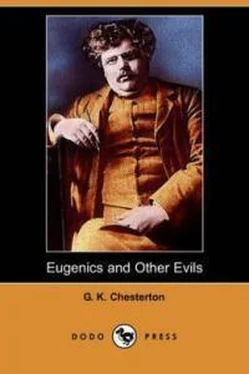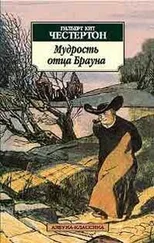But the homeless Englishman must not even remember a home. So far from his house being his castle, he must not have even a castle in the air. He must have no memories; that is why he is taught no history. Why is he told none of the truth about the mediæval civilisation except a few cruelties and mistakes in chemistry? Why does a mediæval burgher never appear till he can appear in a shirt and a halter? Why does a mediæval monastery never appear till it is "corrupt" enough to shock the innocence of Henry VIII.? Why do we hear of one charter—that of the barons—and not a word of the charters of the carpenters, smiths, shipwrights and all the rest? The reason is that the English peasant is not only not allowed to have an estate, he is not even allowed to have lost one. The past has to be painted pitch black, that it may be worse than the present.
There is one strong, startling, outstanding thing about Eugenics, and that is its meanness. Wealth, and the social science supported by wealth, had tried an inhuman experiment. The experiment had entirely failed. They sought to make wealth accumulate—and they made men decay. Then, instead of confessing the error, and trying to restore the wealth, or attempting to repair the decay, they are trying to cover their first cruel experiment with a more cruel experiment. They put a poisonous plaster on a poisoned wound. Vilest of all, they actually quote the bewilderment produced among the poor by their first blunder as a reason for allowing them to blunder again. They are apparently ready to arrest all the opponents of their system as mad, merely because the system was maddening. Suppose a captain had collected volunteers in a hot, waste country by the assurance that he could lead them to water, and knew where to meet the rest of his regiment. Suppose he led them wrong, to a place where the regiment could not be for days, and there was no water. And suppose sunstroke struck them down on the sand man after man, and they kicked and danced and raved. And, when at last the regiment came, suppose the captain successfully concealed his mistake, because all his men had suffered too much from it to testify to its ever having occurred. What would you think of the gallant captain? It is pretty much what I think of this particular captain of industry.
Of course, nobody supposes that all Capitalists, or most Capitalists, are conscious of any such intellectual trick. Most of them are as much bewildered as the battered proletariat; but there are some who are less well–meaning and more mean. And these are leading their more generous colleagues towards the fulfilment of this ungenerous evasion, if not towards the comprehension of it. Now a ruler of the Capitalist civilisation, who has come to consider the idea of ultimately herding and breeding the workers like cattle, has certain contemporary problems to review. He has to consider what forces still exist in the modern world for the frustration of his design. The first question is how much remains of the old ideal of individual liberty. The second question is how far the modern mind is committed to such egalitarian ideas as may be implied in Socialism. The third is whether there is any power of resistance in the tradition of the populace itself. These three questions for the future I shall consider in their order in the final chapters that follow. It is enough to say here that I think the progress of these ideals has broken down at the precise point where they will fail to prevent the experiment. Briefly, the progress will have deprived the Capitalist of his old Individualist scruples, without committing him to his new Collectivist obligations. He is in a very perilous position; for he has ceased to be a Liberal without becoming a Socialist, and the bridge by which he was crossing has broken above an abyss of Anarchy.
Chapter VI
The Eclipse of Liberty
If such a thing as the Eugenic sociology had been suggested in the period from Fox to Gladstone, it would have been far more fiercely repudiated by the reformers than by the Conservatives. If Tories had regarded it as an insult to marriage, Radicals would have far more resolutely regarded it as an insult to citizenship. But in the interval we have suffered from a process resembling a sort of mystical parricide, such as is told of so many gods, and is true of so many great ideas. Liberty has produced scepticism, and scepticism has destroyed liberty. The lovers of liberty thought they were leaving it unlimited, when they were only leaving it undefined. They thought they were only leaving it undefined, when they were really leaving it undefended. Men merely finding themselves free found themselves free to dispute the value of freedom. But the important point to seize about this reactionary scepticism is that as it is bound to be unlimited in theory, so it is bound to be unlimited in practice. In other words, the modern mind is set in an attitude which would enable it to advance, not only towards Eugenic legislation, but towards any conceivable or inconceivable extravagances of Eugenics.
Those who reply to any plea for freedom invariably fall into a certain trap. I have debated with numberless different people on these matters, and I confess I find it amusing to see them tumbling into it one after another. I remember discussing it before a club of very active and intelligent Suffragists, and I cast it here for convenience in the form which it there assumed. Suppose, for the sake of argument, that I say that to take away a poor man's pot of beer is to take away a poor man's personal liberty, it is very vital to note what is the usual or almost universal reply. People hardly ever do reply, for some reason or other, by saying that a man's liberty consists of such and such things, but that beer is an exception that cannot be classed among them, for such and such reasons. What they almost invariably do say is something like this: "After all, what is liberty? Man must live as a member of a society, and must obey those laws which, etc., etc." In other words, they collapse into a complete confession that they are attacking all liberty and any liberty; that they do deny the very existence or the very possibility of liberty. In the very form of the answer they admit the full scope of the accusation against them. In trying to rebut the smaller accusation, they plead guilty to the larger one.
This distinction is very important, as can be seen from any practical parallel. Suppose we wake up in the middle of the night and find that a neighbour has entered the house not by the front–door but by the skylight; we may suspect that he has come after the fine old family jewellery. We may be reassured if he can refer it to a really exceptional event; as that he fell on to the roof out of an aeroplane, or climbed on to the roof to escape from a mad dog. Short of the incredible, the stranger the story the better the excuse; for an extraordinary event requires an extraordinary excuse. But we shall hardly be reassured if he merely gazes at us in a dreamy and wistful fashion and says, "After all, what is property? Why should material objects be thus artificially attached, etc., etc.?" We shall merely realise that his attitude allows of his taking the jewellery and everything else. Or if the neighbour approaches us carrying a large knife dripping with blood, we may be convinced by his story that he killed another neighbour in self–defence, that the quiet gentleman next door was really a homicidal maniac. We shall know that homicidal mania is exceptional and that we ourselves are so happy as not to suffer from it; and being free from the disease may be free from the danger. But it will not soothe us for the man with the gory knife to say softly and pensively "After all, what is human life? Why should we cling to it? Brief at the best, sad at the brightest, it is itself but a disease from which, etc., etc." We shall perceive that the sceptic is in a mood not only to murder us but to massacre everybody in the street. Exactly the same effect which would be produced by the questions of "What is property?" and "What is life?" is produced by the question of "What is liberty?" It leaves the questioner free to disregard any liberty, or in other words to take any liberties. The very thing he says is an anticipatory excuse for anything he may choose to do. If he gags a man to prevent him from indulging in profane swearing, or locks him in the coal cellar to guard against his going on the spree, he can still be satisfied with saying, "After all, what is liberty? Man is a member of, etc., etc."
Читать дальше








